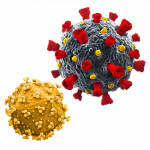Many of us who participated in the early response to HIV/AIDS have been asked if any useful lessons were learned that might help us in dealing with COVID-19.
Implicit in the way that question was sometimes asked was the assumption that the medical response to AIDS was exemplary, a contention I most certainly do not agree with.
Instead and more to the point, the question might have been: Can we avoid repeating the mistakes made in the medical response to HIV/AIDS?
The mistakes that were then made — both with respect to steps that were taken and those that were not taken — were numerous and easily documented.
As examples, they include:
* the failure to make recommendations and pursue studies on the prevention and treatment of opportunistic infections, most strikingly the failure to provide guidance on the prevention of pneumocystis pneumonia until 1989, when the means to do this had been known even before 1981;
* the very inappropriate use of interferon to treat people with AIDS when it was already present in patients and in large quantities, and when evidence already existed that interferon could play a role in pathogenesis;
* and the failure to respond to the movement of the epidemic into African American communities, that was happening in plain sight as early as the late 1980s.
There are many more examples.
It’s difficult to see where responsibility for this dismal response lies. Medical scientists who could see these failings also remained largely silent, or perhaps were not successful in advancing their criticisms.
Should we not try to understand how the indifferent federal medical response to AIDS was able to continue?
How is a medical leadership established in times of crisis? How should it be established, keeping in mind the wellbeing of the public as its goal, safe as possible from political influence?
Sadly, it’s unlikely that this question will ever be addressed, let alone answered. With the increasing privatization of public services over the past 40 to 50 years there is now almost nothing left to defend the public interest.
Whatever goes into the establishment of a medical leadership in times of crisis, in the case of HIV/AIDS, it failed miserably. Can we trust that it will not fail us today?
Unlike the mediocre medical response to HIV/AIDS, the scientific response was spectacularly successful, resulting in major advances in virology and molecular cell biology with implications well beyond HIV/AIDS.
The same appears to be true of the scientific response to COVID-19, the disease caused by the new coronavirus named SARS-CoV-2. Maybe virologists, immunologists and molecular cell biologists have performed so much better than the doctors partly because they are, to a greater extent, shielded from political influence.
There has been much recent publicity reassuring us that we are in good hands with Dr. Fauci leading the medical response. Maybe this is indeed a good thing, but in extoling his virtues, one can’t help but note that the less than lustrous performance of the medical response to HIV/AIDS under his leadership has somehow been transformed into a triumph.
We should not be taken in by this attempt to obscure a less than exemplary past.
We have to admit to what went wrong as a first step to getting it right.








4 Comments
4 Comments